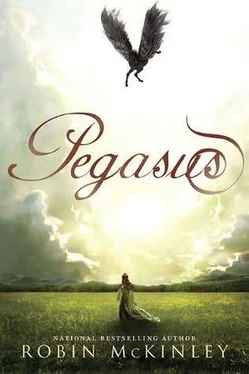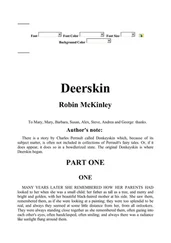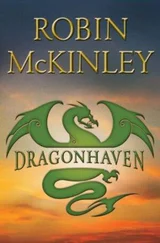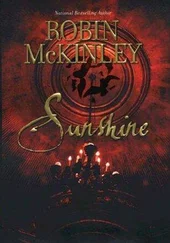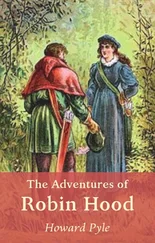Aliaalia had given her one of the pegasi’s little embroidered bags as a farewell gift, and Sylvi had put Ebon’s bead in it—the bead she’d worn round her neck during her six days in the Caves. She hadn’t looked at it since she’d been home.
She tipped it slowly out into the palm of her hand. It lay there, dark, inert—dead. She closed her hand over it and felt as if something inside her were breaking. Her heart? Her will? She squeezed both her hand and her eyes shut. And then slowly opened them again.
As if it had taken a moment to wake up, sleepy after too long a nap, the bead was just beginning to glow, with a faint throb like a heart. At first she thought she was imagining it, but as she watched, the glow strengthened and steadied, till it was so bright she could not see her hand behind it.
For several weeks there was little news; Danacor sent terse descriptions, tied to the legs of carrier-pigeons, of quartering the lower slopes of the boundary mountains. Then a dusty, distressed pigeon missing a few primaries brought the news of the first skirmish; there were a few wounded—although neither Danacor nor his brothers, nor any pegasus—but no one killed. A human messenger on a tired horse brought more news, and, when he returned, he took a packhorse with him, loaded with small padded cages containing more carrier pigeons. About a week after that, a pegasus—no one Sylvi knew—came with more news, both what he could tell and a letter from Danacor hung round his neck in a little bag like a nrala: he was closeted with Corone, Lrrianay and Fazuur for several hours.
The day after he left, Garren rode in through the northwest gate of the Wall with Poih at his side.
Sylvi and Ebon went at once to the king’s receiving room to hear Garren’s report. The scouts, crossing the border and going deep in the wild lands, had discovered the mouths of caves leading—they suspected, as far as they dared explore, as much as the magicians with them could guess—to a great network of underground caves; and the passages they did explore were clearly used by taralians and norindours. Garren looked old and grim and determined. “This is not something Danny wanted to send a messenger with, even a messenger who had seen the caves himself. So I said we’d go, Poih and I. And we could bring more troops back.
“We had Doarday up to take a look, and he believes that there are many more of both taralians and norindours than we have any idea of—that they have been hiding and growing and increasing for a long time. Maybe generations. We should have been keeping better watch . . . but the truth is that we would still not have found the caves if we hadn’t been searching that specific area—”
“Which means that the rocs wanted us to find them,” said the king. “That this is something they have been planning. Neither taralians nor norindours plan far in advance; their great cleverness is on the immediate field of battle, when they can see openings and possibilities that slow humans cannot—and pegasi are too honourable to take such advantage. Nor do the two races live together. All this is, I fear, the doing of rocs.”
Sylvi listened without understanding the details to the rest of the conversation; it ended when the king said, “I will write it down and send a messenger with it now. You need food and sleep, and a regiment cannot move as quickly as a single horse and rider, especially a quick horse and a clever rider.”
“If it please you, sir,” said Sylvi. “There is no one quicker or cleverer than Lucretia.”
“Indeed,” said the king. “If you can spare her, Sylviianel, please send for her.”
Spare her, thought Sylvi. She’s so edgy and impatient she’s become the scourge of the practise yards. We’ll be glad to see her go .
“We cannot know what the rocs’ plan is,” said Garren, “and Danny says that for now we must do the obvious thing—drive the creatures out of their burrows and destroy them—and watch our backs. How soon can the Second Horse Guards be ready to leave?”
“Tomorrow,” said the king. “I don’t guarantee before breakfast, but before noon. I will see if there is a company or two of someone else we can spare as well; because if the rocs are putting their plan, whatever it is, into action, then we must assume we need more eyes actively watching here too.
“That gives you time for food and sleep. And I would have you talk to the queen; she is out on patrol, but she will be here this evening. She hunted taralians in those mountains.”
Garren nodded.“She kept telling us to look for caves—especially a network of caves. Ginab wasn’t enthusiastic and even Doarday thought it unlikely.”
“She’ll be sorry she was right.”
“Yes.” Garren’s smile had no humour in it. He paused long enough to hug Sylvi—without ever quite seeing her, she thought—and left.
Sylvi made to do the same herself. She had already sent a footman to look for Lucretia; it was as well she had someone to send, because her own limbs felt heavy, and her thinking stunned. Taralians and norindours living underground—many of them—ready to pour out upon the country—her country. She could not grasp it—she could not make herself understand that the king would be putting extra watchers on the Wall in response to Garren’s report—that warehouses and under-used buildings inside the Wall would be readied for refugees, or wounded. What she could grasp was that Danacor and Farley, and Garren again soon, were in terrible danger. A terrible danger that, if they could not contain it, would indeed spread over the entire country . . . and at last come here, to the king’s city within its Wall, to the palace, to her home.
She put out a hand blindly and encountered Ebon’s shoulder. Bad , he said.
Very bad.
They turned to leave, but her father beckoned to them. There was a new look on his face. She could never remember a time when he did not seem tired and needing to think about too many things at once, most of which he would not or could not explain to his daughter. But always before he could set it aside occasionally, and play with her or tease her brothers or swing her mother around in an impromptu dance—he was an excellent dancer—or engage them all in a ballad-composing contest, which he would win unless all five of them united to outdo him. This new tiredness was of a sort that could not be set aside, till the end of some great matter was reached. She wished she could see it in his face that he believed that the end would be reached as he wished it to be. Lrrianay walked a few paces away from the human king, and Ebon followed him; Sylvi could hear a faint rustle of pegasus speech. She missed Niahi, and Niahi’s gaiety and sparkle. Niahi had flown home with her mother two days after the party, with the shamans. But with this news even Niahi’s brightness might go dull.
“I have seen Fthoom,” her father said, and sighed. “I am sorry, child—sorry for all of us. But he demands to give his report. I hear in his voice that it is a report that pleases him, which means it will not please us. Those of his assistants who report to me say that he found something not long ago that pleased him tremendously, but they do not know what it is. I have said that we have other, mightier concerns on our hands, but Fthoom says that what he will tell us has great import upon those mightier concerns. You know of the petition to reinstate him—he has hinted all these four years that we need his strength; he says almost openly now that we will need it worse when we hear what he has to say.
“He says he brings proof of the tale that he will tell, and on my orders he spent yesterday in the Hall of Magicians, being grilled by his own. Andovan and Fahlraken have brought me the guilds’ confirmation that what he says is true and that his proof is true proof, though they do not know what of any more than I do. I trust their word, and I trust the Hall.”
Читать дальше
